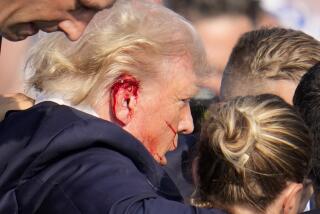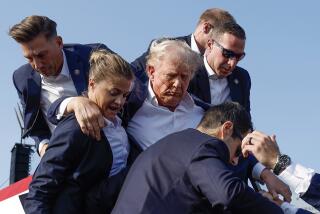Yemen president more seriously injured than reported, U.S. says
- Share via
Reporting from Washington — Yemeni President Ali Abdullah Saleh’s injuries from an attack on his palace mosque last week are more serious than first reported, a U.S. official said Tuesday, casting doubt on whether the embattled ruler can return to power anytime soon.
“He’s got burns, he has some shrapnel injuries and he’s had surgery,” said the U.S. official, who discussed sensitive intelligence matters on condition of anonymity. “I think this will be a protracted recovery. It takes a long time to heal from injuries like that.”
U.S. officials had reported that Saleh, in his late 60s, had burns over 40% of his body and bleeding in his skull, the Associated Press said.
U.S. officials told The Times that they believe Saleh’s palace was hit by rockets Friday and that he also suffered injuries from explosive devices placed in the mosque.
Saleh and other top Yemeni officials were flown to Saudi Arabia on Saturday for treatment at the Armed Forces Hospital in Riyadh.
Yemeni officials had said Saleh suffered only minor injuries and would return within days, but that is unlikely, the U.S. official said.
A Yemeni government spokesman disputed U.S. officials’ description of Saleh’s wounds.
“These reports are baseless,” said Abdu Janadi, deputy information minister, speaking by telephone from Sana, the Yemeni capital. “The president is coming back soon. He is getting well.”
It was Janadi who, shortly after Friday’s attack, told reporters that Saleh “has some scratches, and he will be healed soon; nothing affects his health.”
Yemeni officials have said a rocket hit a mosque in the presidential palace compound where Saleh and his senior leadership and several hundred others were praying. At least 11 guards were killed and more than 150 people wounded.
The uncertainty amid Saleh’s absence, with no sign of an imminent power transfer, raises fear of escalating chaos.
In Washington, meanwhile, a Pentagon spokesman said the U.S. military had suspended training of Yemeni security forces who have played a key role in U.S. counter-terrorism operations in the country.
“Because of the security situation, we put the training in abeyance until the situation improves,” said Marine Col. David Lapan.
Lapan would not comment on whether the suspension of training of Yemeni forces would affect the size of the U.S. military presence in the country, which includes special forces personnel.
Lapan also would not discuss whether the increased violence has led to a greater number of U.S. surveillance planes flying over Yemen.
“We generally don’t talk about surveillance operations,” Lapan said.
Times staff writer Raheem Salman in Baghdad contributed to this report.
More to Read
Sign up for Essential California
The most important California stories and recommendations in your inbox every morning.
You may occasionally receive promotional content from the Los Angeles Times.















